- Home
- Tony Hillerman
Coyote Waits jlajc-10 Page 2
Coyote Waits jlajc-10 Read online
Page 2
“Hold it right there,” Chee said.
The walker stopped. He looked intently at Chee, as if trying to bring him into focus. Then he sighed and sat on the pavement. He screwed the cap off the bottle, and took a long, gurgling drink. He looked at Chee again and said:
“Baa yanisin, shiyaazh.”
“You are ashamed?” Chee repeated. His voice choked. “Ashamed!” With his good hand he reached over the walker’s shoulder, jerked the pistol out of the man’s belt. He sniffed the muzzle of the barrel and smelled burned powder. He checked the cylinders. All six contained cartridges, but three of the cartridges were empty. They had been fired. He jammed the pistol under his belt, snatched the bottle out of the walker’s hand, and hurled it into the sagebrush beside the road.
“Dirty coyote,” Chee said in Navajo. “Get up.” His voice was fierce.
The man stared up at him, expression puzzled. The glare of the headlights reflected off the streaks of rainwater running down his face, dripping from his hair, from his eyebrows.
“Get up!” Chee screamed.
He jerked the man to his feet, hurried him to the patrol car, searched him quickly for another weapon, took a pocketknife and some coins from a front pocket and a worn wallet from his hip pocket. He handcuffed him, conscious of the man’s thin, bony wrists, conscious of the numbness in his own right hand, and the pain in his left palm. He helped the man into the backseat, closed the door behind him, and stood for a moment looking through the glass at him.
“Shiyaazh, ” the man said again. “Baayani-sin.” My son, I am ashamed.
Chee stood with his head bowed, the rain beating against his shoulders. He wiped the back of his hand across his wet face and licked his lips. The taste was salty.
Then he walked into the sagebrush, looking for the bottle. It would be needed as evidence. Chapter 3
THERE WAS NOTHING Lieutenant Joe Leaphorn dreaded more than thisthis unpleasant business of pretending to help people he could not possibly help. But those involved today were a family in Emma’s clan, his in-laws, people from Bitter Water clan. By the Navajos’ extended definition of kinship, they were Emma’s brothers and sisters. He’d rarely heard Emma speak of them but that was beside the point. It was beside the point, too, that Emma would never have asked him to interfere. Certainly not in this case, with one of their own policemen murdered. She would have tried to help them herself, though. Tried very quietlyand she would have been no less impotent than Leaphorn. But Emma was dead now and that left only him.
“We know he didn’t kill that policeman,” Mary Keeyani had said. “Not Ashie Pinto.”
By the white man’s way of reckoning kinship, the Keeyani woman was Ashie Pinto’s niece. In fact, she was the daughter of Ashie’s sister, which gave her among the Turning Mountain People the same status as a daughter. She was a small, bony woman dressed in her old-fashioned, traditional, going-to-town best. But the long-sleeved velvet blouse hung on her loosely, as if borrowed from fatter times, and she wore only a single bracelet of narrow silver and a squash blossom necklace which used very little turquoise. She sat stiffly upright in the blue plastic chair across from Leaphorn’s desk, looking embarrassed and uncomfortable.
While Mary Keeyani explained her relationship to Ashie Pinto, and therefore to Hosteen Pinto’s problem, in the proper fashion of a traditional Navajo, Louisa Bourebonette had not explained herself at all. She sat next to Mary Keeyani, looking determined.
“There is absolutely no doubt that this is all some sort of mistake,” Louisa Bourebonette said in a slow, precise, slightly southern voice. “But we haven’t had any success talking with the FBI. We tried to talk to someone at the Farmington office and then we went to Albuquerque. They simply won’t discuss it. And we don’t know who to get to look for evidence to prove he’s innocent. We thought we could hire a private detective. We thought maybe you could recommend someone who would be reliable.”
Louisa Bourebonette had given Leaphorn her card. He picked it up now and glanced at it again.
LOUISA BOUREBONETTE, PH.D. ASSOCIATE PROFESSOR,
AMERICAN STUDIES
NORTHERN ARIZONA UNIVERSITY
FLAGSTAFF, ARIZONA
This wasn’t the information he wanted. He wanted to know how this trim, gray-haired, sharp-eyed woman was connected to the sorrowful business of Delbert Nez, a young man murdered and an old man destroyed. It was partly the wisdom Leaphorn had accumulated in a long life of police work that people have reasons for whatever they doand the more effort required, the stronger the reason must be. Among Navajos, family is an overpowering reason. Bourebonette was not Navajo. What she was doing required a lot of effort. He put the card in his desk drawer.
“Have you talked to Hosteen Pinto’s attorney?”
“She didn’t seem to know much,” Bourebonette said. She made a small, self-deprecatory face and shook her head. “Of course, they turned Mr. Pinto over to someone brand new in the job. She’d just moved in from Washington. Had just been hired. She told us the Federal Public Defender’s office had two investigators who might be helpful. But
“
Professor Bourebonette let the sentence trail off, intending to let the skepticism in her tone finish it. Leaphorn sat silently behind his desk. He glanced at her. And away. Waiting.
Bourebonette shrugged. “But I got the impression that she didn’t think they would be very helpful. I don’t think she knew them well yet. In fact, she didn’t give us much reason to believe that Mr. Pinto will be well represented.”
Leaphorn knew one of the federal defender cops. A good, solid, hardworking Hispano named Felix Sanchez. He used to be with the El Paso police department and he knew how to collect information. But there wasn’t much of anything Sanchez could do to help these women. And nothing Leaphorn could do, either. He could give them the names of private detectives in Farmington, or Flagstaff, or Albuquerque. White men. What could they do? What could anyone do? An old man had been turned mean by whiskey and had killed a policeman. Why waste what little money his family might have? Or this abrasive white woman’s money. How did she fit into this?
“If you hire a private detective it’s going to be expensive,” Leaphorn said. “He would want some money in advance as a retainer. I’d guess at least five hundred dollars. And you’d be paying his expenses. Mileage, meals, motels, things like that. And so much an hour for his fee.”
“How much?” Professor Bourebonette asked.
“I’m not sure. Maybe twenty-five, thirty dollars an hour.”
Mrs. Keeyani sucked in her breath. She looked stricken. Dr. Bourebonette put a comforting hand on Mrs. Keeyani’s arm.
“That’s about what I’d expected,” Professor Bourebonette said, in a stiff, unnatural-sounding voice. “We can pay it. Who would you recommend?”
“It would depend,” Leaphorn said. “What do you”
Professor Bourebonette interrupted him.
“One would expect, or should expect if she didn’t know better, that you people would take care of this yourselves. That the family wouldn’t have to hire someone to find out the facts in a murder case.”
The anger left Leaphorn with nothing to say. So he said the obvious.
“In a case like this, a felony committed on a reservation, the jurisdiction
“
She held up her hand. “The Federal Bureau of Investigation has the jurisdiction. We know that. We’ve already been told, and we knew it already, being reasonably intelligent. But after all, one of your own men was killed.” A trace of sarcasm crept into Bourebonette’s tone. “Aren’t you a little bit curious about who actually killed him?”
Leaphorn felt himself flushing. Surely this arrogant white woman didn’t expect him to answer that. Not in the presence of the murderer’s niece.
But the professor was waiting for an answer. Let her wait. Leaphorn waited himself. Finally he said: “Go on.”
“Since you don’t seem to be investigating, and since the Federal Bureau of I
nvestigation is content to simply bring Ashie Pinto to trial without any effort to find the actual criminal, we hope you can at least give us some advice about who to hire. Somebody honest.”
Leaphorn cleared his throat. He was trying to imagine this haughty woman in the beautifully finished office of the agent-in-charge at Albuquerque. Nothing but politeness and good manners there, he was sure.
“Yes,” he said. “That’s what we were discussing. And to give you that advice I must know some things. What do you have to tell this private detective? What can you give him to work on? Would it be leads he’d be following on the Reservation - around where Hosteen Pinto lived? Or around Ship Rock and Red Rock where the - where it happened? In other words, what do you know that can help? What do you know that would help him find a witness, something to prove, for example, that Hosteen Pinto was somewhere else when this crime happened? What can you give him to give him a place to start looking?”
Leaphorn paused, thinking he shouldn’t pull himself into this. It was not his case, not his business. Interfering was certain to cause offense in a department that wanted the death of a brother officer balanced with a conviction of his killer. He shouldn’t open the door he was about to open. He should simply tell these women he couldn’t help them. Which just happened to be the sad truth. Still, Mary Keeyani was Emma’s kin. And, still, there were some unanswered questions in that Nez businessas much as he knew about it.
“As a matter of fact,” he said, “if you have any useful informationany witnesses, anything that would lead to concrete evidence that the FBI wouldn’t listen toyou can tell me. I’ll see to it that the Bureau pays the proper attention. Anything you know.”
“We know he didn’t do it,” Bourebonette said. But the anger was used up now. She attempted a small, wan smile. “All we can tell you is why we know he couldn’t have killed the policeman, and that’s nothing more concrete than telling you about the kind of man Ashie Pinto is. Always has been.”
But he did kill a man, Leaphorn was thinking, a long time ago. If I remember -what I read in that report, he was convicted, years ago, went to prison for killing a man.
“Are you a relative?” he asked Bourebonette.
“I am a friend,” Bourebonette said.
Leaphorn looked at her over his glasses, waiting for more than that.
“For twenty-five years,” she added. “At least.”
“Ah,” Leaphorn said.
Professor Bourebonette looked impatient, as if it probably wasn’t worth her time to explain. But she decided to.
“My interest is in comparative mythology. The evolution of myth inside cultures. The evolution of myth as cultures meet and intermix. The relationship of a society’s mythology with its economic base. Its environment. Mr. Pinto has been one of my informants. For years.” She paused.
Leaphorn glanced at her. Was she finished? No. She was remembering.
“He wouldn’t kill anyone,” she added. “He has a great sense of humor. A great memory for the funny things. A great memory for everything.” She looked into Leaphorn’s eyes and said it slowly, as if he was the judge. As if he was the jury. Could whiskey not make a killer out of a funny man, just as it did of sad men and angry men?
“He has a great sense of humor,” Bourebonette repeated.
It didn’t prove anything, Leaphorn thought. But it was interesting. It was also interesting that she was telling him this. A long way to come, a lot of time used, a lot of money to be spent if she was serious about hiring an investigator. And a very flimsy explanation of why she was doing it.
And so Leaphorn had asked the Turning Mountain woman and the professor to wait. He called downstairs and asked for the file marked HOMICIDE; DELBERT NEZ.
He had been away when it happened, waiting in a motel room in Phoenix to be called as a witness in a case being tried on appeal in the federal court there. Even so, he remembered a lot of it. He had read about it every day in the Phoenix Gazette and the Arizona Republic, of course. He had called the Ship Rock subagency station and talked to Captain Largo about it. The Navajo Tribal Police included only about 110 sworn officers, making the murder of any one of them not only memorable but close and personal. He had barely known Delbert Nez and remembered him as a small, quiet, neat young officer. But, like Leaphorn, Nez had worked out of the Window Rock office and Leaphorn had seen him often. Nez had been trying to grow a mustache. That was not an easy task for Navajos, with their lack of facial hair, and his sparse growth had provoked teasing and ribald jokes.
Leaphorn had known the arresting officer much better. Jim Chee. He had run across Chee several times on other investigations. An unusually bright young man. Clever. Some good qualities. But he had what might be a fatal flaw for a policeman. He was an individualist, following the rules if and when they agreed with him. On top of that, he was a romantic. He even wanted to be a medicine man. Leaphorn smiled at the idea. A Tribal Policeman-Shaman. The two professions were utterly incongruous.
Leaphorn found himself wondering if he had been Chee’s first client. After a tough case, in the awful malaise that had followed Emma’s death, he’d hired Chee to do a Blessing Way for him. An impulsive decisionunusual for him. He’d done it partly to give the young man a chance to try his hand as a shaman and partly as a gesture toward Emma’s people. The Yazzies were Bitter Water clansmen and traditionalists. The ceremony would be sort of an unspoken apology for the hurt he must have caused them. He’d left Emma’s mother’s place on the second morning after they’d carried the body out into the canyonunable to endure the full four days of silent withdrawal among her relatives that tradition required. It had been rude, and he’d regretted it. And so he had called Agnes and told her he’d hired a singer. He asked her to arrange the ceremony. She had gladly done it, not needing a reminder that his own clan, the Slow Talking Dinee, was now scattered and almost extinct, or that there was little left of his own family. He’d been uneasy around Agnes. Agnes had never married and, as Emma’s sister, he would have been expected to marry her under the old tradition.
He glanced up at the two women waiting patiently across the desk and then looked back at the report. But he was thinking of Officer Chee, his hair tied in a knot at the back of his head arranging his equipment on the swept earthen floor of the Yazzie hogan. Chee had been nervous, showing Leaphorn where to sit with his back against the west wall of the hogan, spreading a small rug in front of him. Then Chee had extracted from his deerskin jish the little leather sack that was his Four Mountain bundle, two pairs of “talking prayersticks,” a snuff can containing flint arrow points, and a half dozen pouches of pollen. He had solemnly formed the shape of footprints on the earth and marked on them with the pollen the symbols of the sunrays on which Leaphorn would walk. Beyond Chee, through the hogan doorway to the east he could see the rugged ramparts of the Carrizo Mountains reflecting the rosy twilight. He had smelled the pinon smoke from the cooking fires of Emma’s kinfolks and of his own friends who had come to join him in this venture into the spirit world of his people.
At that moment he had wished desperately for a way to call it all off. He was a hypocrite. He did not believe that the ritual poetry that Officer Jim Chee would chant, or the dry paintings he would form on the hogan floor, would control the powers and force them to restore Joe Leaphorn to a life with “beauty all around him.” The beauty had gone somewhere up in the canyon rocks with Emma’s body. Gone forever. He wanted only to follow her.
But there had been no way out of it. And on the second dawn, after the long night of chanting, he had sucked in the fout great ceremonial breaths of cold morning air feeling different than he had felt for weeks. It had not cured him, but it had started the healing. He could thank Shaman Jim Chee for that, he guessed. Or for part of it. But Officer Jim Chee was another matter. If Officer Chee had done his duty, Delbert Nez might still be alive.
“Shot high in the left chest,” the report said. “Apparently at very close range.”
Leaphorn gl
anced up at Mary Keeyani and the professor. “Sorry I’m taking so long,” he said.
“There is time enough,” Mary Keeyani said.
Captain Largo had told him that Chee wanted to resign after the homicide. Getting Nez out of the car, Chee had been burned on both hands, one arm, one leg, and the chest. Largo had gone to the hospital at Farmington to see him. Largo was an old friend. He’d told Leaphorn about it.
“He didn’t just offer to resign,” Largo had told Leaphorn. “He insisted on it. He gave me his badge. Said he’d screwed up. That he should have gone to assist Nez when he knew Nez was in pursuit. And of course he should have gone.”
“Why the devil didn’t he go?” Leaphorn had asked. “The silly son-of-a-bitch. What was his excuse?”
“He didn’t offer any excuses,” Largo had said, his voice resenting Leaphorn’s judgmental tone. “But I reminded him that his report showed Nez had been laughing. From what little he heard on the radio Nez wasn’t taking it seriously. Like it was a joke. And I told him he couldn’t resign anyway. He can’t resign until we get Pinto tried.”
Thinking of that conversation now as he turned the page in the report, Leaphorn remembered that Largo had some sort of vague clan kinship link with Officer Chee. At least he’d heard that. Navajo Tribal Police regulations prohibited nepotism in the chain of command. But the rules were just picked up from biligaana personnel regulations. The white rules didn’t recognize clan connections.
The next sheet was the report of Sergeant Eldon George. When George arrived he had found Chee sprawled in the front seat of his vehicle, half-unconscious from shock. Pinto was asleep on the back seat, handcuffed. George had attempted to treat Chee’s burns with his first aid kit. Another Navajo Police unit had arrived, and a San Juan County Sheriff’s car, and a New Mexico State Police patrolman and then the ambulance that Chee had called to pick up Nez. Instead, it had taken Officer Chee. Pinto had been transported to the county jail at Aztec and booked on an assault chargethe toughest rap possible for a crime committed on federal trust land until the federals got involved and filed their felony homicide complaint.

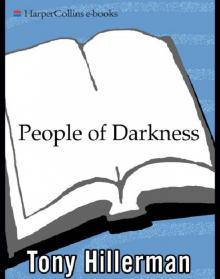 People of Darkness
People of Darkness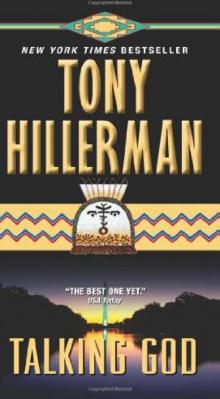 Talking God jlajc-9
Talking God jlajc-9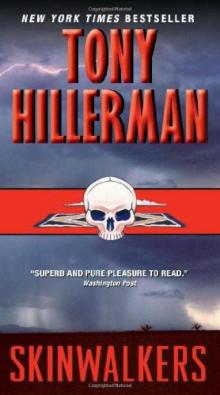 Skinwalkers jlajc-7
Skinwalkers jlajc-7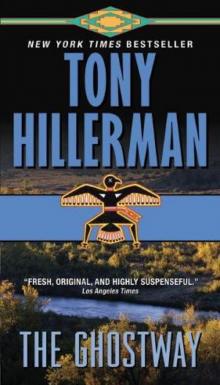 The Ghostway jlajc-6
The Ghostway jlajc-6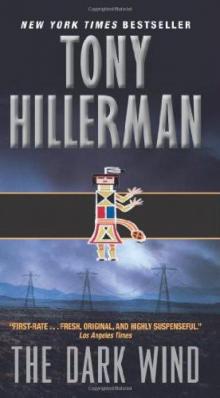 The Dark Wind jlajc-5
The Dark Wind jlajc-5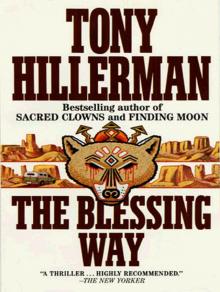 The Blessing Way
The Blessing Way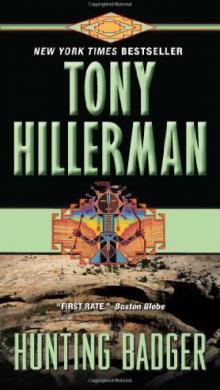 Hunting Badger jlajc-14
Hunting Badger jlajc-14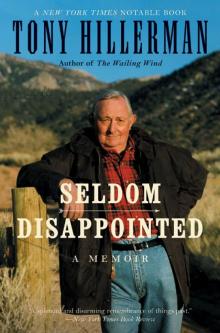 Seldom Disappointed: A Memoir
Seldom Disappointed: A Memoir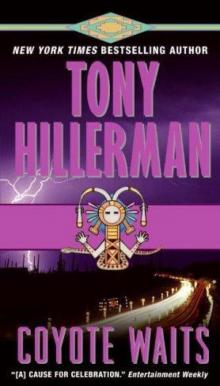 Coyote Waits jlajc-10
Coyote Waits jlajc-10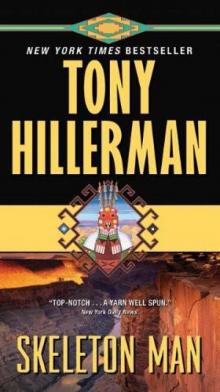 Skeleton Man jlajc-17
Skeleton Man jlajc-17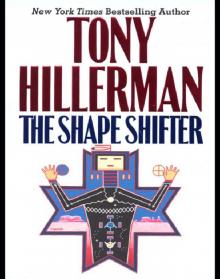 The Shape Shifter
The Shape Shifter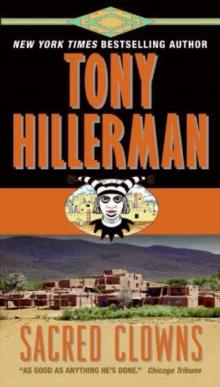 Sacred Clowns jlajc-11
Sacred Clowns jlajc-11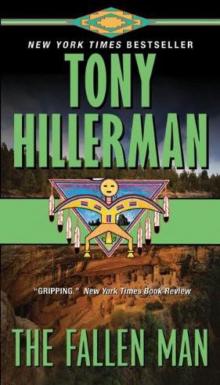 The Fallen Man jlajc-12
The Fallen Man jlajc-12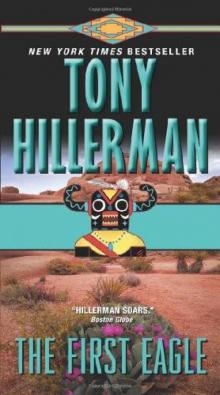 The First Eagle jlajc-13
The First Eagle jlajc-13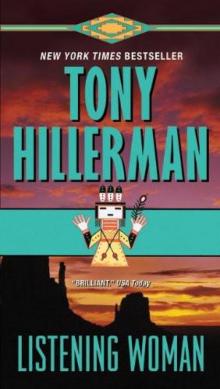 Listening Woman jlajc-3
Listening Woman jlajc-3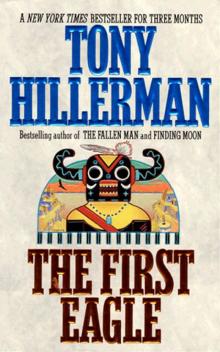 The First Eagle
The First Eagle Skeleton Man
Skeleton Man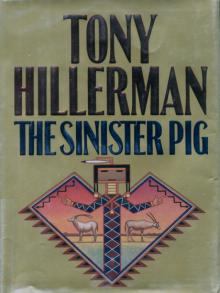 The Sinister Pig jlajc-16
The Sinister Pig jlajc-16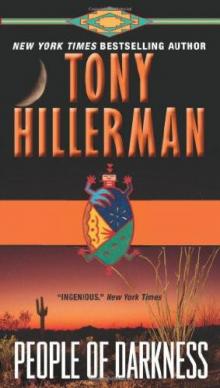 People of Darkness jlajc-4
People of Darkness jlajc-4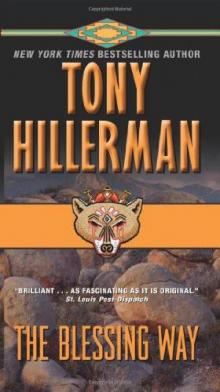 The Blessing Way jlajc-1
The Blessing Way jlajc-1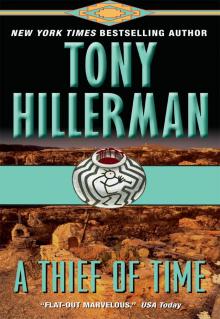 A Thief of Time
A Thief of Time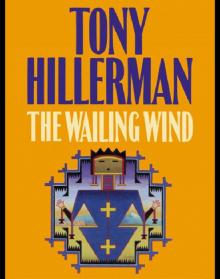 The Wailing Wind
The Wailing Wind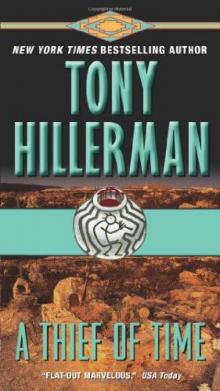 A Thief of Time jlajc-8
A Thief of Time jlajc-8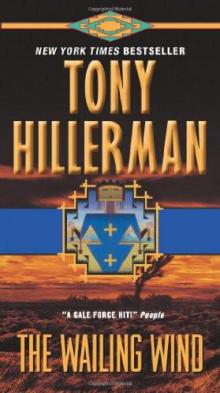 The Wailing Wind jlajc-15
The Wailing Wind jlajc-15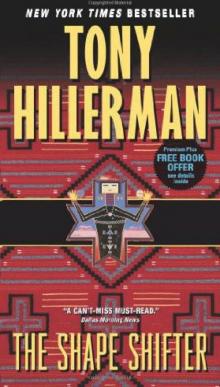 The Shape Shifter jlajc-18
The Shape Shifter jlajc-18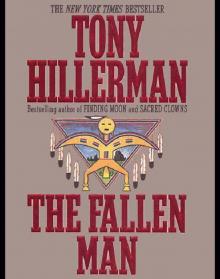 The Fallen Man
The Fallen Man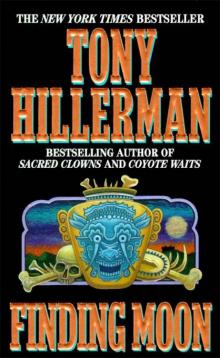 Finding Moon
Finding Moon